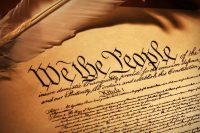Energy law is the field of law concerned with creating, enforcing and challenging laws that regulate energy use. Laws exist that regulate the creation and harvesting of energy. There are laws that regulate taxation of energy use. Energy companies and the public alike must navigate energy laws as they relate to the sale, use and conservation of energy resources. Many people don’t realize how much energy laws and regulations impact their daily life. Each time you put gasoline in your (…)
Employment Law
Employment law is the collection of laws and rules that regulate relationships between employers and employees. Employment laws say when an employer can hire employees and when the employees can work. The laws cover what an employer must pay the employee for their work. They create minimum requirements for working conditions for employees. Following employment law When an employer wants to hire someone, there’s a lot they have to know. There are minimum wage laws that require the employer to (…)
DUI / DWI Law
DUI (driving under the influence) and DWI (driving while impaired) law is the body of law that makes up criminal drunk driving and impaired driving charges. Any law that penalizes driving under the influence or driving with an unlawful bodily content of alcohol or drugs is a DUI / DWI law. DUI / DWI law involves both prosecuting and defending against cases of drunk driving. There are several ways to be a drunk driver In all 50 U.S. states, DUI / (…)
Derivatives and Futures Law
Derivatives and futures law is the collection of laws that regulate trading in derivatives and futures. Derivatives and futures law involves regulations. It also involves compliance. Practicing derivatives and futures law requires identifying applicable laws and regulations, creating a compliance plan and helping clients negotiate business transactions. Attorneys in the area of law may also help their clients defend against enforcement actions. What are futures and derivatives? A derivative or future is a financial contract where the value of the (…)
Defamation Law
Defamation law is the area of law that relates to communications about the reputation of another person. Defamatory speech is a communication that might hurt the reputation of someone else. The purpose of the area of law is to protect people from having their lives and livelihoods ruined or significantly altered because of untrue statements against them. However, the law still protects a person’s First Amendment right to speak freely without being held liable for saying something insulting, making a (…)
Cyber law
Cyber law otherwise known as “internet law” is the area of law that regulates how people use the internet. There are cyber laws that are criminal laws and there are cyber laws that are civil laws. Any law or regulation that involves how people use computers, smartphones, the internet and other related technology is cyber law. Cyber law is also called digital law. As technology changes, the laws that govern electronic communication change, too. Cyber law encompasses all of the (…)
Cultural Property Law
Cultural property law is the body of law that relates to protecting the buildings, artifacts and other items that are significant to a people and culture. Cultural property is the collection of unique real and personal property that’s important to a culture. The field of cultural property law seeks to protect cultural items that are important to a society or group. Cultural property may include any of the following: Ancient buildings Cultural buildings like museums and performing arts centers Significant (…)
Cryptography Law
Cryptography law is the body of law that relates to securing and protecting information from unauthorized access. Cryptography laws protect individuals from having their personal information disseminated without their consent. They also work to protect government secrets as part of a military defense strategy. Another name for cryptography law is encryption law. What Is Cryptography? Cryptography or encryption is the practice of modifying information with a secret encoding key or other method of transforming the information to another form. The (…)
Criminal Law
Criminal law is the area of law that relates to prohibited conduct in society. When government leaders take steps to ban certain actions, they create crimes. Criminal law is the area of law that involves enforcing criminal law as well as defending against allegations of violations of criminal law. The purpose of outlawing conduct is to protect society. Law makers typically pass a law with the belief that it’s for the public good. Criminal laws must be applied evenly to (…)
Corporate Law
Corporate law is the body of laws, rules, regulations and practices that govern the formation and operation of corporations. It’s the body of law that regulates legal entities that exist to conduct business. The laws touch on the rights and obligations of all of the people involved with forming, owning, operating and managing a corporation. What’s a corporation? A corporation is a legal entity that exists to conduct business. It’s a separate legal entity from the people who make it. (…)
Copyright law
Copyright law is the area of law that protects the right of authors, artists and creators to profit from their work. The purpose of copyright law is to encourage people to make creative works. Lawmakers believe that people are more likely to invest the time and effort to make creative, artistic works if they know they’re going to have the exclusive right to profit from those works. What’s protected under copyright law Copyright laws protect the rights of the people (…)
Contract Law
Contract law is the body of law that relates to making and enforcing agreements. A contract is an agreement that a party can turn to a court to enforce. Contract law is the area of law that governs making contracts, carrying them out and fashioning a fair remedy when there’s a breach. Anyone who conducts business uses contract law. Both companies and consumers use contracts when they buy and sell goods, when they license products or activities, for employment agreements, (…)
Consumer Law
Consumer law is the group of laws that protect the public at large from unfair and predatory business practices. Consumer laws protect the public from unscrupulous ways of doing business. The area of law requires compliance from the corporations that consumer laws regulate. What does consumer law regulate? The practice of consumer law concerns itself with protecting individuals from unfair trade, inaccurate information and unethical ways of doing business. Say the phrase consumer law and most people probably think of (…)
Construction Law
Construction law is the combination of all of the areas of law that apply to construction work. The process of building is complex. Builders have to follow a large number of rules and regulations. There are many things that they need to know and do before they ever pour the first bit of cement or clear the first tree. People in the construction industry have to work with private entities and government representatives in order to conduct business. They must (…)
Constitutional Law
Constitutional law is the law that relates to interpreting, implementing and amending the United States constitution and the constitutions of the 50 states. It is an area of law that focuses on what the constitution says, what it means and what its limitations are. As social and political issues change and develop in the United States, attorneys who practice constitutional law bring these issues to the courts to ask for clarification about the meaning, interpretation and enforcement of the constitution. (…)
Computer Law
Computer law encompasses all of the laws that relate to the transfer, use and storage of electronic information. Basically, it’s any law that has to do with computers and other electronic devices that store information. Computer law includes a wide range of topics including security, private property rights and even constitutional law. Contracts When you buy a computer, sign up for an account on a website or even complete a credit application online, you have to check the box that (…)
Communications Law
Communications law is the practice of law that relates to the exchange of information using technology. It’s any law that involves the regulation and use of electronic telecommunication. Communication law includes technologies like radio, television, cable and broadband internet. It involves the creation of rules and policies that govern use of these technologies. Communication regulations govern both public and private communications. Lawmakers create these regulations with the goal of making communication technologies accessible to all Americans at a reasonable price. (…)
Class Action Lawsuit
A class action lawsuit is a lawsuit with many plaintiffs. When a case is a class action case, there are a lot of people who claim they’ve been wronged by the defendant. The plaintiffs have similar complaints. The courts allow all of the plaintiffs to join together in order to litigate their issues together. Why do class action cases exist? Courts allow litigants to join together and bring their cases as one class action in order to conserve resources. Rather (…)
Business Organization Law
Business organization law is the body of law that relates to creating, managing and dissolving businesses. There are several ways to organize a business. Each type of business structure has its own set of rules to follow. Each type of business structure also comes with its own advantages and drawbacks. A business lawyer helps their client choose the right business structure, complete paperwork filing, manage ongoing organizational issues and even helps dissolve the business when it’s appropriate. Helping clients go into business (…)
Business Law
Business law is sometimes called mercantile law or commercial law and refers to the laws that govern the dealings between people and commercial matters. There are two distinct areas of business law; regulation of commercial entities through laws of partnership, company, bankruptcy, and agency and the second is regulation of the commercial transactions through the laws of contract. The history of these types of laws dates back several centuries and can be seen in the peace-guilds where members would pledge (…)




















